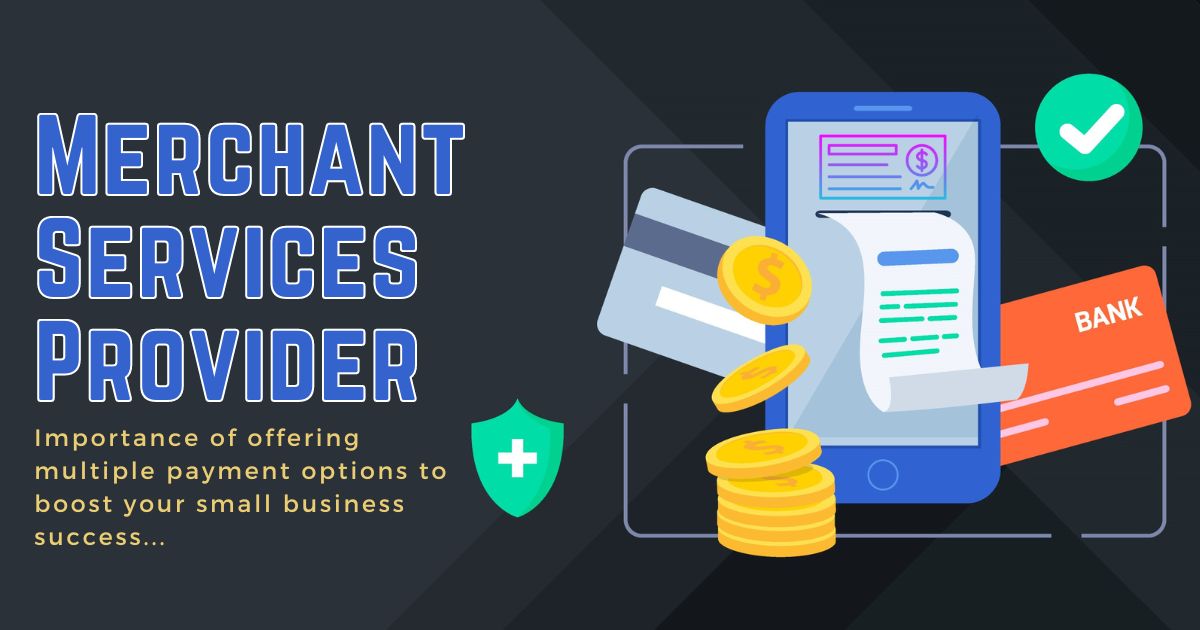
| May 17th, 2024 |
Choosing the Right Merchant Services Provider with Multiple Payment Options!
To keep themselves competitive in today’s fast-paced and increasingly digital industry, small businesses must deal with a slew of obstacles. One of the most important considerations they must make is choosing the right merchant services provider and offering a number of payment alternatives to fulfill client requests. This thorough guide seeks to provide small business owners with the information they need to make informed decisions that improve their operational efficiency and customer happiness.
Understanding Merchant Services —
Merchant services cover a wide range of financial services designed specifically for businesses to execute transactions. These services are essential for any small business that wants to accept credit cards, debit cards, eCheck and other types of electronic payments. Here’s a deeper look at why selecting the appropriate supplier is crucial.
Key Factors to Consider When Choosing a Merchant Services Provider —
Transaction Fees:
Transaction fees are charges applied to every transaction processed through the service. These can include interchange fees, assessment fees, and processor markups. It’s essential to understand these fees to avoid unexpected costs.
Customer Support:
Reliable customer support is critical. Look for providers that offer 24/7 support with knowledgeable representatives who can promptly resolve any issues that arise.
Integration with Existing Systems:
Ensure the merchant services provider can seamlessly integrate with your current systems, such as your point-of-sale (POS) system, accounting software, and e-commerce platforms.
Security Features:
Payment security is paramount. Opt for providers that offer robust security features, including PCI compliance, encryption, and tokenization to protect sensitive customer data.
Reputation and Reviews:
Research the reputation of potential providers by reading customer reviews and testimonials. A provider with a strong track record of reliability and customer satisfaction is a safer bet.
The Benefits of Offering Multiple Payment Options —
Modern consumers demand payment methods to be flexible and convenient. Offering a choice of payment options allows small businesses to not only meet these expectations, but also generate growth and client loyalty.
Enhancing Customer Experience:
- Catering to Preferences:
Different customers prefer different payment methods. While some might prefer credit cards, others may opt for digital wallets like Apple Pay or Google Wallet. Offering multiple options ensures you cater to a broader audience.
- Reducing Cart Abandonment:
A lack of preferred payment options is a common reason for cart abandonment in e-commerce. By providing various payment methods, you can reduce this risk and increase conversion rates.
- Boosting Sales:
Studies have shown that businesses offering multiple payment options tend to see higher sales volumes. This is because customers are more likely to complete purchases when their preferred payment method is available.
Expanding Payment Methods:
- Credit and Debit Cards:
Accepting credit and debit cards is a must for any business. They remain the most popular payment methods due to their convenience and widespread use.
- Digital Wallets:
Digital wallets are rapidly gaining popularity. Services like PayPal, Apple Pay, and Google Wallet offer secure and quick payment processes, appealing to tech-savvy consumers.
- Bank Transfers and ACH Payments:
For larger transactions, bank transfers and Automated Clearing House – ACH payments are preferred due to lower fees and the ability to handle high-value transfers.
- Buy Now, Pay Later (BNPL):
BNPL services like Klarna and Afterpay allow customers to split payments into installments, making high-ticket items more accessible and potentially increasing average order values.
- Cryptocurrency:
While still emerging, cryptocurrencies like Bitcoin offer an alternative for those interested in decentralized payment options. They can attract a niche market of tech enthusiasts and investors.
Implementing the Merchant Services and Payment Options —
Assess Your Needs:
Evaluate your business model and customer base to determine the most suitable payment options. Consider factors such as transaction volume, average transaction value, and customer demographics.
Research Providers:
Compare different merchant services providers based on the factors mentioned earlier. Look for transparent pricing, robust security, and excellent customer support.
Integration and Testing:
Ensure that the selected payment options integrate seamlessly with your existing systems. Conduct thorough testing to identify and resolve any issues before full-scale implementation.
Educate Your Staff:
Train your staff on how to use the new payment systems effectively. This includes troubleshooting common issues and providing excellent customer support.
Monitor and Optimize:
Continuously monitor the performance of your payment systems. Gather customer feedback and analyze transaction data to identify areas for improvement.
Conclusion —
Choosing the right merchant services provider and providing a variety of payment methods are crucial steps for small businesses looking to succeed in a competitive market. Businesses may improve customer happiness, reduce cart abandonment, and increase sales by taking into account crucial variables such as transaction fees, customer service, and security features, as well as accepting numerous payment methods. As technology advances, maintaining current on emerging trends and continually refining payment procedures can ensure long-term success and growth.